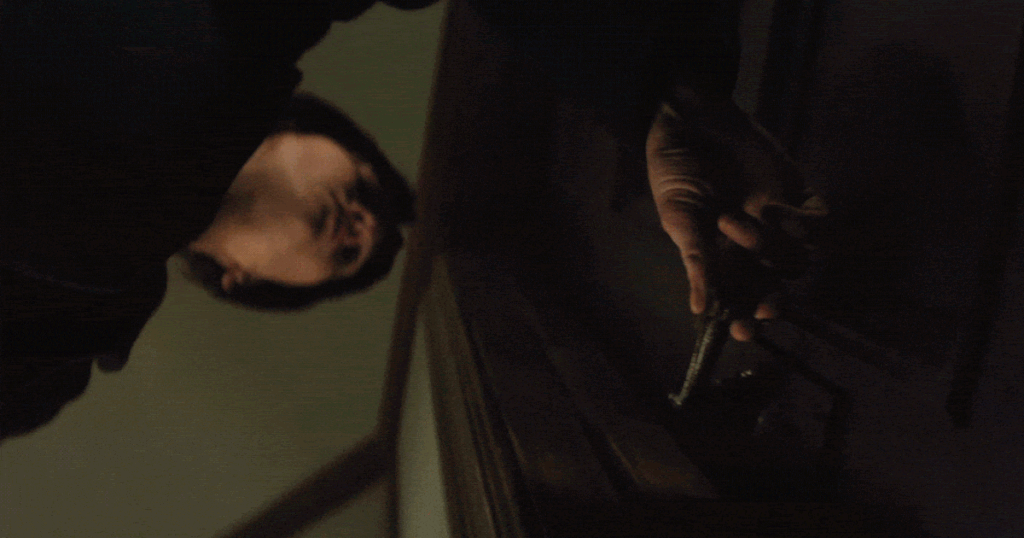In the movie Heretic, Hugh Grant tells two Latter-day Saint missionaries, “You will see miracles.”
The trailer shows two female missionaries, or “sister” missionaries, locked in a maze-like cell and given a choice of doors to test their faith. The film, which has yet to be released, strikes me as a vivid allegory to the real-life claustrophobic feeling I experienced as an LDS missionary. I have never been kidnapped or locked up by insane strangers, and yet I was, so to speak, trapped inside my own home.
I listened to Grant’s words. As the trailer showed footage of the maze and then the women trying to escape, the footage brought back the suffocating memories of my time as a missionary on Temple Square in Salt Lake City. I didn’t experience any literal horror movie tropes, but I did endure the tirade of a man who claimed Latter-day Saint prophets and apostles were part of a secret conspiracy called the Triad.
But I dreamed of being injured badly enough to make an honorable return home, but not so bad that I was disabled for life. And I wasn’t the only one who felt that way. I’ve spoken to many former missionaries who served reluctantly, or who hoped to escape without shame. My husband, who served in Venezuela during the attempted coup, dreamed of it escalating into a bloody civil war so he could return home sooner.
The title of the film, “The Heretic,” gives us a clue. A heretic is someone who is on the inside trying to undermine the faith of others. The heretic is not a Hugh Grant villain; it is probably the missionaries themselves. They cannot escape on their own terms or in their own time. They must submit to a character-building program and to an outside authority that will ultimately decide if they have done their duty well.
Like the sisters in the film, I believed that my worthiness and ability to return to the celestial kingdom (Mormonism’s highest heaven) after death depended on my willingness to be obedient and endure to the end. I believed in patriarchy. I believed that the male leaders of the Church had all the answers. I had a deep-rooted belief that I needed to listen to my priesthood leaders. When I was feeling sick, I talked to my mission president. He told me that I didn’t have enough faith and that if I just read the scriptures and prayed, everything would be okay. I prayed, read the scriptures, and then went back to him. I told him that I wanted to go home. He told me that I had to stay here unless I found someone to marry me. He asked my name, and I told him. He called the young man, and when he came back to me, he said, “Sister, he doesn’t want to marry you.” When he said that, I felt like I was back in middle school, naked in front of my classmates, and terrified.
Looking back, I was clearly depressed and, as a result, had caught all the viral hype. What started as a simple ear infection developed into a chain reaction of eating away at my emotions, gaining 40 pounds, and cutting off all my hair. I was breaking the rules.
In those days, the only days missionaries could call home were Mother’s Day and Christmas. One January, I called my mother secretly. She was never one to break the rules, but inevitably she asked my brother to call the mission president and ask him to ask that I not call home.
Abandoned by my family, the visitors’ center became my prison, my only escape being hiding in the labyrinthine tunnels beneath Temple Square and making long trips to the bathroom to sit on the floor and lock my companions out.
Of course, some will easily dismiss me and say, “Well, this isn’t a typical missionary experience. She was clearly mentally ill.” Go ahead. I think my experience was more common than we’d like to admit. I didn’t know how to walk away. I felt the walls closing in, just like when I saw the trailer for “Heretic.”
I would say that the horrific trials that take place in the maze of this film represent the institutional authority to which missionaries, especially women, must submit and their powerlessness in the face of it. Hugh Grant’s character is merely a vehicle for the tests of faith and devotion that the Lord’s servants must endure — the tests that ultimately sanctify them.
What I felt when I was a missionary seems to be what missionaries feel today. However, with the internet and social media, missionaries are not as isolated. Yet, I find that missionaries still feel trapped. They are trapped by societal pressure not to return home early lest they be seen as failures by their fellow members. The stigma that returned missionaries experience may lead them back to the house of fear.
At Temple Square, I could have walked across the street to the food court. I was an adult. But my choice and worthiness depended not only on my ability to continue serving a mission, but also on my ability to tell everyone that these were the best 18 months of my life.
It wasn’t the best.
I wish I could go back in time and tell the outcast and missionary me, “Just walk out that door and you’ll be free.”
Beth Adams is a travel consultant and writer and her work can be found at CrazyUs.com.
Beth Adams She lives in Salt Lake City with her family and enjoys traveling internationally. She is a travel consultant and writer, and you can find her work here: Crazy Ass.
Salt Lake Tribune We’re committed to creating a space for Utahns to share ideas, perspectives and solutions to move our state forward. We need your insight to do so. Find out how you can share your opinion herePlease contact us by email email address.

